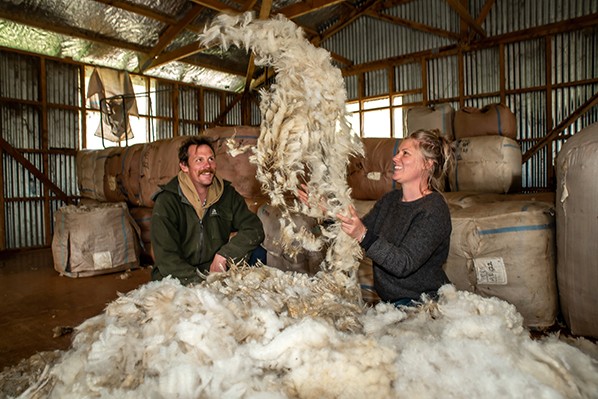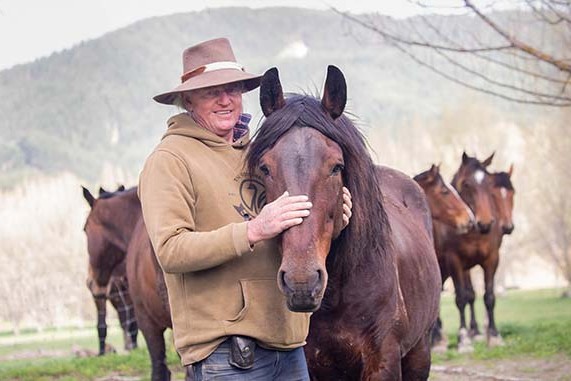Annabelle Latz
off rural criminals is a far cry from the lifestyle of the young surfer who moved to Northland in November 1970.
Ian Russell is an Angus breeder on Pouto Peninsula, northern Kaipara Harbour, where he farms 1300ha, and leases a couple of other blocks nearby.
A big change he has seen is the rise of crime in the area, and he can’t emphasise enough the importance of farmers sticking together and communicating.
Over the years he’s had his truck shot at, had cows and sheep harmed and killed by shotgun, had stock stolen, had his shearing shed burnt down, had a person in his paddock burning his standing hay and ploughing up his paddock, and received death threats on the phone.
It’s been going on for about 15 years, and the methamphetamine scene in Northland has been a major factor and cause.
“Last March there were seven cows shot by the road in the stomach. Eight years ago I lost 13 animals in six days. They even put a cow’s head in my letterbox.”
It was about that time, eight years ago when there was a film crew with a camera set up in his roadside woolshed to capture footage, filming a documentary about crime in New Zealand. Ian believed local criminals had been watching the activity and became aware they were possibly caught on camera.
“Then my woolshed was burnt down. It was really sad, it was a 1933 vintage woolshed, all kauri, it was a bit of a community hall.”
What saddens and frustrates him the most is the lack of accountability for these crimes.
“No one was prosecuted, because they had to be pretty much caught red handed.”
A year ago Ian set up a group for local farmers, whereby neighbours met at his farm and discussed the crime issues, named ‘Meat Watch.’
“The meeting lasted for six hours, where we networked together and as a result of this and tip offs, we learned who some of the offenders were.”
Ian admitted farmers generally aren’t always great at communicating, but they were all being affected.
“This is crazy, we are all losing stock. I think it’s a bigger farmer issue. In a sense farmers are on their own, the only people who are really going to look after farmers, are other farmers.”
Chatting to Ian at his kitchen table, overlooking Kaipara Harbour, he spoke of the millions of dollars of rural crime; 780 head of cattle and 2800 sheep stolen, and wounded stock.
“That’s not including sheep being killed by dogs, I once had 120 killed.”
Farm equipment like ballcocks are not spared either.
“That stuff’s not being stolen by kids to sell in Auckland.”
With restrictors on his windows and a beam across his driveway which buzzes when someone is on their way up to the house, he couldn’t emphasise enough the importance for neighbours to look out for one another, be observant of strange behavior, and keep talking to one another.
“It’s a national problem now, we need to roll our sleeves up and help each other.”
He has always been involved in beef farming and been breeding commercial angus since 1978.
Originally from Cambridge, and while in Northland to enjoy some surf in the early 1970s, Russell landed himself a farm job.
“I was asked to pick up hay.
“It went from throwing a few bales around, and I was soon offered a job.”
That was Pouto Forest farm, a three-tiered operation of stock, horticulture and pine.
Ian worked there for 24 years, briefly as assistant manager, then general manager.
In the mid-1990s he got the opportunity to go farming on his own account by taking over the lease of the land. And buying the livestock, 12,000 sheep and 5500 cattle.
Not wanting to be at the mercy of the commodity markets, he decided to focus on breeding Angus.
“And the breeding cows did better on some of the rougher forest grazing.”
The stock cost him $1.5 million, and the grazing price was well negotiated. The New Zealand beef industry was also experiencing a price crash, which worked in Ian’s favour.
“The local trade schedule was back to $1.59/kg hook weight. Given the downturn I thought, ‘maybe it’s doable’.”
Ian has seen changes in his industry over the years and enjoyed the science and challenge of breeding good Angus cattle, a breed he describes as hardy and traditional.




